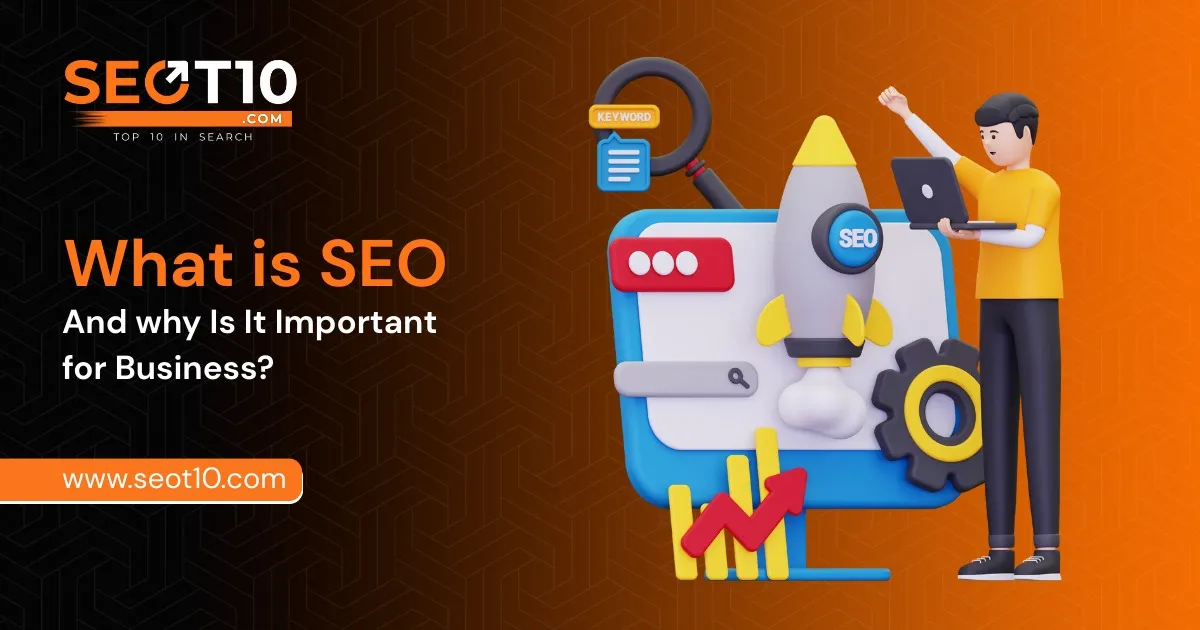In the modern digital landscape, where online presence plays a pivotal role in determining the success of a business, SEO (Search Engine Optimization) is a critical tool in helping businesses thrive. Understanding SEO and its importance is vital for any business looking to improve its visibility and online presence. Whether you are a small startup or a large corporation, SEO can help your business rank higher in search engine results, drive more traffic, and convert that traffic into customers.
What is SEO?
SEO, or Search Engine Optimization, is the process of optimizing a website to rank higher in search engine results pages (SERPs). The goal of SEO is to increase a website’s visibility on search engines like Google, Bing, and Yahoo, to attract more organic traffic. Organic traffic refers to visitors who come to your site through unpaid search results.
SEO involves various techniques and strategies, which can be divided into on-page and off-page optimization. On-page SEO refers to practices like keyword optimization, content creation, and improving the structure of your website. Off-page SEO, on the other hand, focuses on building external backlinks to increase your site’s authority and credibility.
Why is SEO Important for Business?
SEO is not just about increasing the quantity of traffic to your website; it’s also about attracting the right type of visitors. Here’s why SEO is crucial for business growth:
- Improves Website Visibility
SEO helps improve your website’s visibility in search engine results. When your website appears at the top of search results for relevant keywords, it is more likely to attract potential customers. The higher your ranking, the more likely users are to click on your website link. - Increases Organic Traffic
Organic traffic is often the most valuable type of traffic. It’s free and highly targeted, as users searching for specific keywords are actively looking for solutions. By optimizing your website with relevant content, targeted keywords, and user-friendly design, you can attract organic traffic, which is more likely to convert into leads or sales. - Enhances User Experience
A key aspect of SEO is ensuring that your website is user-friendly. This includes improving site speed, making it mobile responsive, and ensuring that visitors can easily navigate through your site. A positive user experience is crucial for reducing bounce rates, increasing engagement, and ultimately, improving conversion rates. - Boosts Brand Credibility and Trust
Ranking high on search engines helps establish your business as an authority in your industry. When users see your website at the top of the search results, they are more likely to trust your brand. SEO helps build this trust by ensuring that your website delivers valuable content, is easy to navigate, and performs well on all devices. - Cost-Effective Marketing Strategy
Compared to paid advertising, SEO is a long-term investment that can yield sustainable results. While it may take some time to see significant results from SEO efforts, the return on investment (ROI) can be much higher in the long run. Once your website is optimized, you can continue to attract traffic without constantly paying for ads. - Targeted Audience Reach
SEO helps you target your audience more precisely. Through keyword research, you can identify the phrases and terms potential customers are searching for. By optimizing your website for those keywords, you can ensure that your content is seen by the right people—those who are more likely to convert into paying customers. - Improves Conversion Rates
Effective SEO not only brings more visitors to your site but also improves the chances of converting those visitors into customers. When your site is properly optimized, it creates a seamless user experience, which leads to higher engagement and better conversion rates. - Local SEO Increases Local Visibility
For businesses with physical locations, local SEO is crucial. Local SEO helps your business appear in local search results, such as Google Maps, making it easier for nearby customers to find your business. By optimizing your site with local keywords, your business can attract more foot traffic and increase local sales. - Keeps You Ahead of the Competition
In today’s competitive digital market, staying ahead of your competitors is essential. SEO allows you to continually improve your rankings, keeping you visible to potential customers and maintaining your edge in the market. By investing in SEO, you ensure that your business remains competitive in your industry. - Facilitates Better Insights
SEO provides valuable insights into customer behavior, preferences, and trends. Tools like Google Analytics and Search Console give businesses the data they need to understand what’s working and what’s not. With this data, you can make informed decisions about your marketing strategies and optimize your business operations.
Key SEO Strategies to Implement for Your Business
To leverage SEO for your business’s success, here are some essential strategies to implement:
- Keyword Research
Keyword research is the foundation of SEO. By identifying the terms and phrases your target audience is searching for, you can optimize your content to rank for these terms. Use tools like Google Keyword Planner or Ahrefs to find relevant keywords. - On-Page Optimization
On-page SEO includes optimizing your website’s content, meta tags, headers, and images. Ensuring that your content is valuable and keyword-optimized helps improve your rankings. - Quality Content Creation
Content is king in the world of SEO. By creating valuable, informative, and engaging content, you can attract and retain visitors. Make sure your content is optimized for both search engines and human readers. - Building Quality Backlinks
Backlinks from authoritative websites are a critical ranking factor. Aim to get quality backlinks to your site, as they help increase your site’s credibility and improve rankings. - Mobile Optimization
With more people browsing the internet via mobile devices, ensuring your website is mobile-friendly is essential. Google uses mobile-first indexing, so a mobile-optimized website is crucial for SEO success. - Improving Site Speed
Site speed is a key ranking factor for search engines. A slow-loading website can lead to a high bounce rate and negatively affect your rankings. Use tools like Google PageSpeed Insights to test and improve your site’s loading speed. - Local SEO
If your business has a physical location, it’s essential to optimize for local search. Claim and optimize your Google My Business listing, use local keywords, and ensure your business information is consistent across all online directories.
Conclusion
In today’s competitive digital landscape, SEO is an indispensable tool for businesses. It enhances visibility, drives organic traffic, and builds credibility, ultimately contributing to higher sales and business growth. By implementing effective SEO strategies, businesses can ensure that they remain competitive, attract the right audience, and continue to thrive in an ever-evolving digital world.
FAQs
What is the main goal of SEO?
The main goal of SEO is to improve a website’s visibility in search engine results, driving organic traffic to the site and increasing the chances of converting visitors into customers.
Why is SEO important for small businesses?
SEO is important for small businesses because it helps them compete with larger companies by improving their online visibility and reaching potential customers without a hefty marketing budget.
How long does it take to see results from SEO?
SEO is a long-term strategy, and it may take several months to start seeing significant results. However, with consistent effort, the rewards can be substantial over time.
Can SEO help my business get more leads?
Yes, SEO helps attract more targeted traffic to your site, increasing the chances of converting visitors into leads or sales.
What is the difference between SEO and SEM?
SEO (Search Engine Optimization) focuses on improving organic search rankings, while SEM (Search Engine Marketing) includes paid strategies like Google Ads to drive traffic to your site.
How often should I update my SEO strategy?
SEO is an ongoing process, and it’s essential to regularly update your strategy based on changes in algorithms, user behavior, and market trends.


